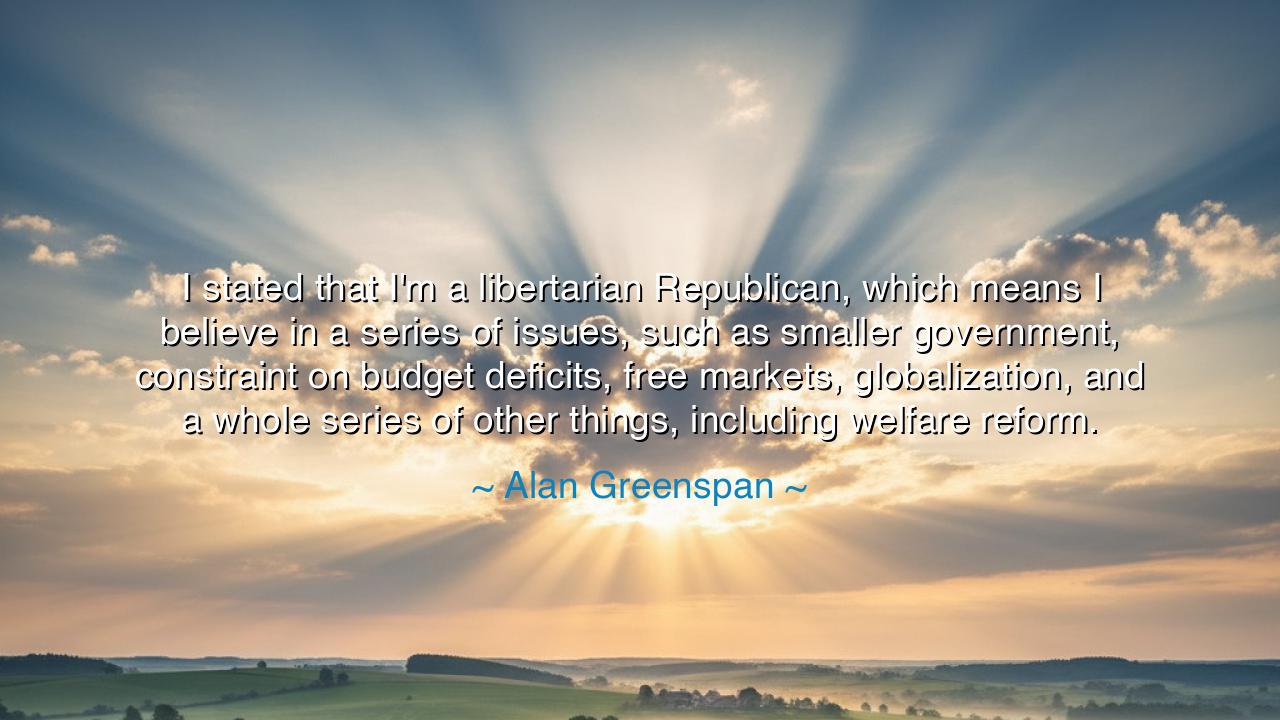
I stated that I'm a libertarian Republican, which means I believe
I stated that I'm a libertarian Republican, which means I believe in a series of issues, such as smaller government, constraint on budget deficits, free markets, globalization, and a whole series of other things, including welfare reform.






Hearken, children of prudence and seekers of wisdom, and attend to the words of Alan Greenspan, who proclaimed with measured clarity: "I stated that I'm a libertarian Republican, which means I believe in a series of issues, such as smaller government, constraint on budget deficits, free markets, globalization, and a whole series of other things, including welfare reform." In this declaration lies a meditation on freedom, responsibility, and the intricate balance of governance and economy. Greenspan reminds us that ideology is not a mere label, but a constellation of principles guiding the stewardship of society’s resources and the conduct of policy.
The origin of Greenspan’s insight rests in his lifelong engagement with economics and public policy. As a steward of national wealth and advisor to governance, he observed that the size and scope of government directly influence the freedom and productivity of its citizens. Smaller government, constrained deficits, and a reliance on markets encourage innovation, personal initiative, and efficiency, while overreach can suppress enterprise, erode incentives, and burden future generations.
Consider the imagery of constraints and liberty. Just as a river must be guided by levees to nourish the land without flooding it, so too must governance balance authority with restraint. Greenspan’s libertarian Republicanism emphasizes that fiscal prudence and disciplined budgets allow society to flourish, creating conditions for opportunity, trade, and the ethical deployment of resources. In this vision, freedom and responsibility are entwined, like bow and string, shaping the arc of national prosperity.
History provides vivid exemplars of this principle. During the post-World War II era, the United States experienced unprecedented growth in part because government avoided overreach, allowing markets, entrepreneurship, and trade to thrive. Similarly, welfare reform initiatives in the 1990s emphasized personal responsibility, skill development, and opportunity, rather than prolonged dependence—demonstrating that policy aligned with principles of individual accountability and limited government produces both freedom and societal resilience.
Greenspan’s reflection also illuminates the global dimension of policy. Free markets and globalization expand the horizons of commerce and human ingenuity, linking nations in a network of trade and cooperation. Yet such openness demands discipline at home—balanced budgets, prudent regulation, and ethical governance—so that the nation can participate robustly without succumbing to the perils of mismanagement or unsustainable debt. Liberty at home sustains influence abroad.
The lesson is timeless: freedom and prosperity are nurtured by disciplined governance, responsibility, and ethical policy. Markets thrive when governments provide infrastructure, enforce law, and protect property rights, but do not encroach unduly upon enterprise. Citizens flourish when opportunities are abundant, trade is open, and dependence is replaced by accountability. Greenspan teaches that ideology, when practiced with reason and balance, shapes the moral and economic health of a nation.
Practical actions follow naturally: advocate for responsible governance, support policies that balance opportunity with accountability, engage with economic literacy to understand the consequences of public spending, and cultivate personal responsibility alongside civic awareness. By doing so, one ensures that freedom, prosperity, and ethical stewardship reinforce one another, guiding both individuals and society toward lasting strength.
In sum, Greenspan’s words illuminate a profound truth: liberty, discipline, and responsibility are inseparable pillars of a flourishing society. Let this wisdom guide leaders, citizens, and thinkers alike, ensuring that governance, markets, and policy coalesce to foster opportunity, innovation, and moral clarity. In the balance of authority and restraint, prosperity is both sustained and justly distributed.
If you wish, I can craft an even more epic, mythic version, turning Greenspan’s reflection into a heroic narrative of governance, liberty, and the moral stewardship of wealth—perfect for immersive audio storytelling. Do you want me to do that?






AAdministratorAdministrator
Welcome, honored guests. Please leave a comment, we will respond soon